by Nadia Ramoutar MMM Communications Coordinator Ireland 23.07.2025
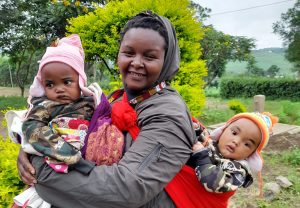 Recently a number of my friends participated in a fundraiser to make money for the Samaritans. In Ireland, this is a well-known charity that provides help to people in their darkest hours. They even have a 24/7 hotline that people can ring anytime and talk to a trained volunteer. It’s a wonderful gift to any community.
Recently a number of my friends participated in a fundraiser to make money for the Samaritans. In Ireland, this is a well-known charity that provides help to people in their darkest hours. They even have a 24/7 hotline that people can ring anytime and talk to a trained volunteer. It’s a wonderful gift to any community.
It is interesting how over many years we have come to think of the Samaritans as people who are kind and help strangers and neighbours who are in a bad situation. However, as many of you know, when Jesus told the parable of the Good Samaritan in Luke 10, at the time this was not the case. In the response to the trick question “Who is my neighbour, Jesus told the famous story of three people who saw someone in dire need and how the first two, who were supposed to be spiritual, ignored the neighbour.
It was the third person, the Samaritan, who aided the person going up and beyond the call of duty to which Jesue said “Which of these proved to be a neighbour to this man?”
It is a powerful question and one that is as timely now as it was then. At the time of this story, the Samaritans were not a popular group of people. They were disliked and the Jewish people of Galilee and Judea shunned the Samaritans. Our view of them now is totally different.
When we look at the condition of the world today, we can see that there is a lot of noise around “belonging” and who is our neighbour raises its head again. When we look at the atrocities being done globally it seems that political and spiritual boundaries are being used in horrific ways not only to divide people but to persecute them. It is difficult to stay in touch with world news without a sense of dread and anxiety.
When I visited the MMM Missions in Tanzania I was standing with the MMM Sisters at the top of a hill. I could see as the starting time for the outreach antenatal clinic was growing close. I saw women and girls coming from every direction. Some were carrying one of two babies or small children. Many were pregnant. It was a true gift to see the women coming together like a river of humanity and flowing up towards us.
What tribe the women or girls were from, or what religion they were, was not a question. They were now our “neighbours” and in need of support and care. What would it take to spread this idea again and to bring Jesus’ example back into humanity?
We are facing dark times in our world and it is time now to say, “I will be your neighbour.” No questions asked.
by Sr. Sheila Campbell MMM Ireland 19.07.2025
 In our times we sometimes fail to take account of how we influence one another. We have all heard of “influencers” on social media platforms, but I am guessing that most of us think “I would never be influenced by anyone else!” We have such a high regard for our own autonomy!!
In our times we sometimes fail to take account of how we influence one another. We have all heard of “influencers” on social media platforms, but I am guessing that most of us think “I would never be influenced by anyone else!” We have such a high regard for our own autonomy!!
Recently I heard a story which made me think again. One of the Sisters was sharing at coffee about working with young couples who were in marital difficulties. In the culture where she was working, the custom was that the mother would feed her husband first. Then she would feed the children. Lastly, and only when she had all the chores done, she would eat herself. At the Health Centre where she worked, they had a different philosophy. They asked the couple to try a different system. They asked them to feed the children first and then sit down together to eat. Just that. They were not into therapy as in the Western world, but just a small change to help the husband and wife see each other as equal human beings, both concerned with the education and upbringing of their children.
The change was remarkable. Not alone did marriages improve, but the level of domestic violence in the society was drastically reduced.
Now, I think to myself, what small change can I make in my life patterns to produce good results like that? Recently I was reading a blog by one of our young Sisters. She was recommending acts of kindness. When you do a small act of kindness, it changes you on the inside to becoming a kinder person. It also has a ripple effect. When you notice a small act of kindness you want to reach out and do one yourself.
I remember being in Chapel one day and a Sister who was confined to a wheelchair noticed the person in front of her was cold. She inched forward until she was near enough to reach her and draped a shawl around her shoulders. That is kindness. Up to the end of her life she was thinking of others and how she could help.
So that is my challenge today – be kind, notice others’ needs, and maybe God will be kind to me and help me be a better person.
by Sr. Sheila Devane MMM Ireland 16.07.2025
 Summertime in Ireland with its long, long days brings us many opportunities: for holidays, special ceremonies, pilgrimages, outdoor activities, and riveting sports’ events either here or elsewhere and most of them available on TV.
Summertime in Ireland with its long, long days brings us many opportunities: for holidays, special ceremonies, pilgrimages, outdoor activities, and riveting sports’ events either here or elsewhere and most of them available on TV.
The annual remembrance of the dead in their graveyards is held in Drogheda in July and we MMMs decorate each sister’s grave with beautiful flowers and attend the mass and memorial service that Sunday. People come up to talk about different sisters whom they knew well and still mourn. It is also the season of the wonderful international tennis tournament at Wimbledon UK where the top world players compete for the top prizes – the Challenge Cup (men’s singles) and the Rosewater Dish (women’s singles).
I love to watch Wimbledon and look forward to the first two weeks of July each year. Little else gets done by me each afternoon! I am glued to the screen and to the matches. While watching I always feel in the presence of two now deceased, wonderful Medical Missionaries of Mary: Sisters Sheila Hogan and Eileen Carmel Keogan. Let me tell you about them!
Sister Sheila died in May 1990 and would have missed watching Wimbledon on TV that year – possibly though she was watching from Heaven? In the time I knew her she arranged her holidays for the first two weeks of July every year, went to Bettystown where she appreciated the other sister guests talk of swimming, walking on the beach and meeting up with friends – but she was virtually in Wimbledon for every match. She was a wonderful woman, a trained nurse and our first radiographer and if I am not mistaken one of the first people to train in radiography in Ireland? In the large community in Drogheda at that time she arranged monthly talks called “Our Lady’s Circle” where she brought in guest speakers on a whole variety of topics. She then called on one of us to propose a vote of thanks and another to second it –in this way we were getting experience in public speaking as well as a wealth of information on subjects that we mightn’t otherwise know anything about!
I recall talking to her about tennis; she played as a schoolgirl and later as a young woman and knew all about the best racquets, strongest non-slip shoes, most suitable clothing and as a radiographer knew too of the strains, sprains and fractures that tennis players are most vulnerable to suffering. And Sheila knew the players long before Wimbledon began as she avidly followed their careers all year. I feel her beside me and would love to hear her commentary!
Sister Eileen Carmel died in June 2011. She watched Wimbledon daily every year on one of the TVs in the big rooms in Beechgrove before its renovation. She particularly enjoyed having a companion or two watching with her and invited and encouraged us to join in. Eileen played tennis and many other sports at secondary school, and she proudly spoke of her sports’ prowess showing off a large cup which she won one year in the Dominican Convent, Cabra, where she was a boarder. She kept the cup in her small bedroom in St. Patrick’s corridor where it served as a useful receptacle for whatever small items needed housing at any time!
Eileen was a wonderful character and a force of nature. She established hospital pastoral care in Ireland and given her warm, vibrant personality and great love of life it is amazing that anyone died in her care – but they did, and they could not have had a kinder, more caring person than herself seeing them off to their gentle God. As I write this short article and watch a very uneven game of tennis where a magnificent, seeded female player is just not getting into the game at all, I can hear Eileen beside me talking of days when she too did not play her A game…. and lost.
I am truly blessed to have met these two great women, to have had the opportunity to share a hobby with them and to learn so much more from the giftedness and richness of their generous lives. May they rest in peace, and may we all continue to find creative and special ways to remember our deceased, loved ones who we still miss and to whom we owe so much.
by Sr. Jo Anne Kelly, MMM Ireland 12.07.2025
 In our mission we had a big hospital and so we also had a big community. The main house was not big enough for all of us so some sisters slept in a low small house beside it. Our dining room in the main house opened out to the garden, and outside the dining room door we had Polly, our parrot, in his cage. Polly was very popular and learnt many words from us and mostly we enjoyed him. If there was any fuss or commotion one of our sisters had a habit of saying “God save us”. She was from the North of Ireland. Polly picked up the words and the accent.
In our mission we had a big hospital and so we also had a big community. The main house was not big enough for all of us so some sisters slept in a low small house beside it. Our dining room in the main house opened out to the garden, and outside the dining room door we had Polly, our parrot, in his cage. Polly was very popular and learnt many words from us and mostly we enjoyed him. If there was any fuss or commotion one of our sisters had a habit of saying “God save us”. She was from the North of Ireland. Polly picked up the words and the accent.
Polly also picked up sounds. From his perch he could hear the bathroom toilet flushing upstairs. He learnt to copy the sound. In the beginning we thought it funny but one day we had special visitors in for dinner and Polly began flushing over and over again. So Polly got moved to outside the smaller house.
In that house there was one big room which we used as library and also sitting room. We had some good books there accumulated over the years and some other small treasures. We also had a gramophone and a selection of long playing records, also gathered up over the years. . The sister who was most often on call at night slept in the bedroom next to the library. I will call her Brigid. She was accustomed to being called any hour of the night especially to the maternity hospital.
One morning at 2am Brigid was woken up with a flashlight in her face and a man pointing a gun at her. He said “Don’t shout or I will kill you” She was so terrified that she jumped up screaming and shouting at the top of her voice, screaming so hysterically that she frightened the man. As she made for the door, he fled through the library and out through the window he had broken to get in. Brigid came out still screaming. Once out, we in the big house heard her and rushed down. Night staff from the hospital also came. When she settled somehow we went to the dining room and made tea and talked and talked.
Later we went over to see what happened. Outside, under the broken window was a bag of books and records and other things ready to be carried away. The man had got away as fast as he could and, in fact, we lost nothing except the window glass. He couldn’t have been a very serious robber, maybe hungry or in need.
However, since someone had kindly called the police, there had to be an investigation. So next morning a big crowd gathered outside the small house, some officials, many to sympathize, others just out of curiosity and everybody wanted to hear everything. The talk and discussions went on for ages as new people arrived.
Eventually one man decided to make a speech. There was a lull in the conversation and a few of us who were standing near the door, heard Polly, saying in his best Northern accent .”God save us”
by Sr. Margaret Anne Meyer MMM USA 09.07.2025
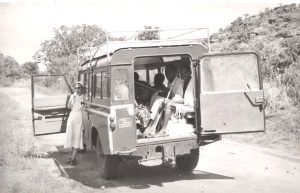 It was with boundless joy that I met Sr. Kay Lawlor when I landed in Tanzania, and she kindly gave me such a warm welcome that all the trauma of the trip was soon forgotten. The next day was March 1st, 1978, and we had a big celebration for the two postulants, Protegia Peter Slaa and Lydia Kijuu. We had ice cream, and I thanked God for them and the grace to start a new mission after 22 years on my date of entrance to MMM, March 1st, 1956.
It was with boundless joy that I met Sr. Kay Lawlor when I landed in Tanzania, and she kindly gave me such a warm welcome that all the trauma of the trip was soon forgotten. The next day was March 1st, 1978, and we had a big celebration for the two postulants, Protegia Peter Slaa and Lydia Kijuu. We had ice cream, and I thanked God for them and the grace to start a new mission after 22 years on my date of entrance to MMM, March 1st, 1956.
After a few days, we travelled to Makiungu. I never saw so many cattails in my life. All the fields were covered by them. I soon learned that this was the local food and that it was called millet. The area was a semi desert place with little rainfall. Millet thrived here and was rich in protein. It was not necessary to eat beans with it. God is incredibly wise in directing what food the people should eat according to the local reality.
The Community welcomed me with open arms. They were happy that someone had come to relieve Sr. Doctor Genevieve Van Waesberghe to return to Drogheda to write the Constitutions. Sr. Genevieve was a great help in showing me the routine of the hospital work. The hospital had one hundred beds and was situated twenty miles from the Regional Government Hospital in Singida. A bus full of patients used to travel out daily for an outpatients visit. Thank God we had good medical assistants who could see and prescribe for the vast majority of the patients and save the more difficult ones for the doctor to see. At that time there was only one doctor doing the general medical work. Sister Doctor Salus Linde specialized in tuberculosis and Leprosy. I learned a lot about these diseases from her. In Uganda we were not allowed to treat these conditions but had to send them to specialist centres. I remember seeing one man who had no fingers able to dress himself and say the rosary on an exceptionally large wooden rosary which was almost as big as himself.
It was a bit difficult for me to live with my previous novice mistress, who was now the Hospital Administrator. I thought she would be judging me all the time. It was my custom not to keep things in but to tell someone, so I prayed for guidance in how to do this. Sr. Margaret O’Conor was so gracious in this matter. She said those days are over and you have come a long way. Let’s get on with it. I was very relieved and was incredibly grateful to her and we became good friends.
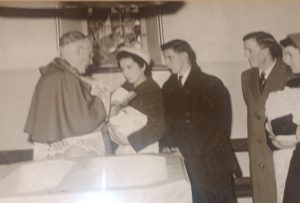 by Catriona Dillon Ireland 05.07.2025
by Catriona Dillon Ireland 05.07.2025
The year was 1957. Cardinal Cushing from Boston came to Drogheda to officially open Our Lady of Lourdes Hospital for MMM. It was the month of September, and I was eight years old. Our parents got an invitation to the celebration and we three girls were brought along. We were dressed in our Sunday best.
After the ceremony we went inside where long tables were covered with lovely white tablecloths. The tables groaned under the weight of tasty sandwiches, delicious cakes and trifles. Large teapots were passed around filling cups of tea for thirsty adults. There was mi-wadi orange juice for the children.
Towards the end of the evening an announcement came through that Louth had won the All Ireland football final. We all cheered and clapped till our hands were sore.
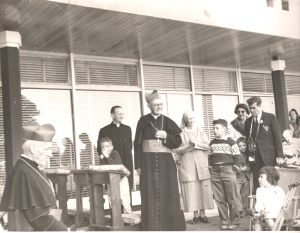 Two years later, in April 1959, Cardinal Cushing returned to Drogheda. This time to officially dedicate Our Lady of Lourdes Church which is right beside the MMM Motherhouse. He also baptised many babies. The first two babies to be baptised were John McArdle (Frank’s brother) and Jacinta McCormac. In 1966 the Cardinal came back to Drogheda. He arranged to meet with the children whom he had baptised. He gave them all a dollar bill.
Two years later, in April 1959, Cardinal Cushing returned to Drogheda. This time to officially dedicate Our Lady of Lourdes Church which is right beside the MMM Motherhouse. He also baptised many babies. The first two babies to be baptised were John McArdle (Frank’s brother) and Jacinta McCormac. In 1966 the Cardinal came back to Drogheda. He arranged to meet with the children whom he had baptised. He gave them all a dollar bill.
This memory is dedicated to all the wonderful Sisters, nurses and doctors who have cared for us for the last seventy years.
by Sr. Rita Higgins MMM Ireland/Honduras 02.07.2025
 The pot sits on an open fire in a smoky kitchen. It is a small room full of the sound of chopping, cutting and peeling. The scent of fresh pine resin, lemon, camomile, ginger and eucalyptus wafts about us. Today we are making our own cough syrup. There is excitement in the air. Old and young, men and women and children are involved in the activity.
The pot sits on an open fire in a smoky kitchen. It is a small room full of the sound of chopping, cutting and peeling. The scent of fresh pine resin, lemon, camomile, ginger and eucalyptus wafts about us. Today we are making our own cough syrup. There is excitement in the air. Old and young, men and women and children are involved in the activity.
For the twentieth time the chickens are chased out, dogs are staring longingly through the doorway. Someone checks the recipe again and we sit and wait for the mixture to cook. There is an animated discussion about what tea to drink when a child has asthma. Take 5 mint leaves, 5 eucalyptus leaves, 3 leaves of oregano, add boiling water and wait five minutes. Dona Carmen is painstakingly writing down the recipe. Dona Maria is illiterate, so her grand-daughter, Angelina, writes it for her. It is a very reassuring atmosphere. There is great peace amidst the activities. One of the elderly men is speaking about the recipes his father used. Don Angel commands attention when he speaks. He has a natural authority and a strong sonorous voice. He is saying “although we are poor people we have great riches – our plants, the soil, our families.” There is much quiet nodding in agreement.
Finally, the mixture on the fire is ready. Several people taste it with approval. Someone says it should be poured into the bottles in silence out of respect for the healing quality of the mixture. We look in awe at what has been produced and pray that whoever uses the syrup may find comfort and be restored to health. As we come towards the end of the workshop, coffee is prepared. This is the staple drink, home grown and roasted. After mother’s milk, coffee becomes everyone’s drink, we savour its hot, black, sweet flavour. The chickens dash in once more and we are all too absorbed to chase them out again. The radio plays in the background. It is almost time for the adult education programme.
Two questions: When is Maria coming to visit us? (referring to Mary Egan, MMM Associate who is involved in the literacy programme.) ” She will come soon. How is your reading this week?” A final prayer is said. “Goodbye, go well, and que le vaya bien!”
See you next month at the workshop.
(first published by MMM in 2001)
by Nadia Ramoutar MMM Communications Coordinator Ireland 28. 06. 2025
 Recently, I have had the pleasure of working with the MMM Sisters to record a new song praising the gifts given by founder Mother Mary Martin. It’s a beautiful song written by MMM Sr Jacinta. She is very talented in writing and also in singing. It was great fun to gather an audience and film the choir performing. When I was directing this music video something occurred to me about the power of music, not just for those performing it but also for those listening to it. So I decided to do a little research on this. What I find confirmed to me that music is not just pleasant, it is important to our wellbeing.
Recently, I have had the pleasure of working with the MMM Sisters to record a new song praising the gifts given by founder Mother Mary Martin. It’s a beautiful song written by MMM Sr Jacinta. She is very talented in writing and also in singing. It was great fun to gather an audience and film the choir performing. When I was directing this music video something occurred to me about the power of music, not just for those performing it but also for those listening to it. So I decided to do a little research on this. What I find confirmed to me that music is not just pleasant, it is important to our wellbeing.
The relationship between music and the brain is fascinating and we really don’t know enough about it yet. But it is clear that music helps the brain to organise and operate at higher function. If we think of it this way, music serves like exercise for our brain.
Music also offers us significant value in reducing our stress levels and expressing emotion in a healthy way. It also serves to alter our emotional state in positive ways.
My oldest son, Devin, is studying to get his Masters degree in Music Therapy. Because of this I have learned a lot about how music can help with not just recovery but also during surgeries. Music can reduce stress considerably and several experiments and medical trials show the positive impact. Unfortunately, music therapy is not used nearly as much as it can to benefit people. More research is just coming out now.
The Harvard Health news reported that a study done in New York on cataract patients showed impressive results. The listeners also reported that they felt calmer and better during the operation. Earlier research, though, found that surgeons showed fewer signs of stress and demonstrated improved performance while listening to self-selected music. So it benefitted both the patient and the surgeon.
Music can add so much to our daily life but what will also really bring us benefits is dancing to the music. It has been shown that of all exercise methods, dancing benefits the brain greatly and not just the body. You can see that adding a little bit of music to your daily life routine could bring many significant health and psychological benefits.
Life can be stressful and listening to bad news all the time can have a negative impact on us at several levels. Making space and time in our life to include music and movement is a wonderful investment in our wellbeing. It is worth the effort and consistency over time will bring us major benefits.
MMM Publications 1954 Ireland 25.06.2025
A story from early MMM life in Anua, Nigeria
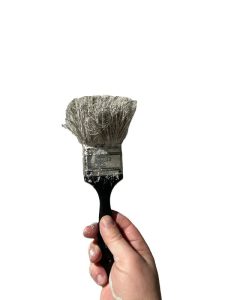 The week before the “big day”, (the consecration of Bishop Ekandem, first Nigerian bishop in West Africa) reminded me of the crossroads incident that happened in Ireland during the War. Irish American soldiers were coming down from Derry to visit their friends and relatives in the twenty-six counties. They all described themselves as “army technicians”.
The week before the “big day”, (the consecration of Bishop Ekandem, first Nigerian bishop in West Africa) reminded me of the crossroads incident that happened in Ireland during the War. Irish American soldiers were coming down from Derry to visit their friends and relatives in the twenty-six counties. They all described themselves as “army technicians”.
This proved too much for one country youth wo enquired,
“ What is a technician, anyway?”
“Can you hold a paintbrush?” enquired the visitor. “Yes.” “Can you do this?”, making imaginary strokes with a paint brush.
“Yes, of course.”
“Then, I guess you are a technician.”
Well, for one week at least all of us in the mission at Anua have been technicians. Pliny says that the cobbler should not go beyond his last. But we went further than that, we only stopped short at the matchet. Such flying of brooms and paint brushes, needles and suds. The woodmen and the wahermen, the carpenters and tailors – all were on overtime to have all-in ship-shape order for the great occasion. That is all but the head tailor. He was one of the untouchables, much too busy preparing Bishops “cloth” to be bothered with Sisters’ palaver. Important guests were invoiced for days in advance, and everything was scheduled to a nicety with no margin left for mistakes or loss of time.
Consequently, we had never tested the newly turned canvas seat on our best outdoor chair, and so, with a rending zipp, it gave way under the first important caller.
by Sr. Jane Frances Ihekuna MMM Nigeria 21.06.2025
 On that fateful day, I embarked on a journey which I knew nothing about, no address, no companion, so confused of what to do, worried about how the journey would be. All I knew was that I must arrive somewhere, but I had no clue about the place. All I knew was that I had a destination. With hope, I will get to my destination, with openness, accept the destination in good faith.
On that fateful day, I embarked on a journey which I knew nothing about, no address, no companion, so confused of what to do, worried about how the journey would be. All I knew was that I must arrive somewhere, but I had no clue about the place. All I knew was that I had a destination. With hope, I will get to my destination, with openness, accept the destination in good faith.
While on this journey, I encountered some ups and downs of life. There were times I fell and times I was tired, weak and discouraged to continue. Going backwards was war, going forward was scary. There was a book I took along with me. One fateful afternoon, I just opened the book to know its content, I found myself reading the book with confidence. At once I realized I was filled with energy, happiness and zeal to continue with my journey. I set off to continue and I held that book so tight, close and in reverence because I never knew its worth until after that encounter.
At every stage of this journey, I met different people; some were false friends who tried to discourage me, trying to convince me to remain with them. Some claimed to be my companions. Most fell off to where they belonged, some tried to pull me down due to selfish interest, envy and jealousy. I never realized this until I got to the junction of self-evaluation which took me through the road of introspection, that brought me to self-awareness, revelations, growth and change of perception.
Arriving at a particular place, I told myself that I needed to take a break, enjoy the environment, adopt some of its living and values. And also, to lay a foundation there, so that at any time, I can freely spend some time there.
After that moment, I felt so convinced that at least I am becoming aware of the knowledge of my destination; though not too clearly. I realized that this particular environment is preparing me ahead for my future journey. At this point, I am still enjoying the environment, bringing it into my day-to-day encounter with the creatures around me.
So far, so good, it is a wonderful journey with enriching experiences.
Do enjoy every one of your moments but be prudent in all that you do.
The Word of the Lord (the Holy Bible) is my companion together with the Holy Spirit. You can never walk alone when you value the Word and work in accordance with God’s commandments.
Enjoy the ever presence of God in your life journey
